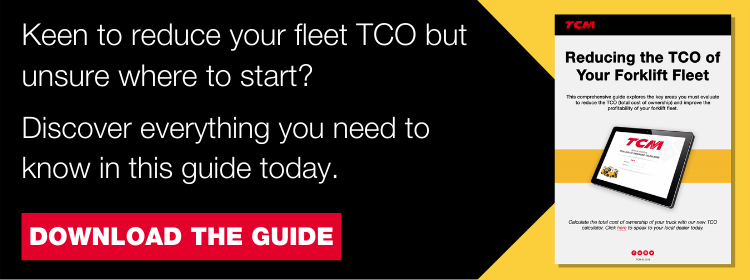
In a previous post, we shared our early findings from the Material Handling Survey 2017. Now the survey is complete, we are back to report on the key challenges limiting material handling productivity.
In 2018, with rising fuel costs and a greater demand for operators in material handling, business productivity is becoming increasingly vital to managing costs, performance, and fuel and operator efficiency.
The report reflects data collected from a survey we conducted in late 2017. This survey included Operations Managers, Operations Directors, Logistics Managers, Logistics Directors, Owners/MDs and Warehouse Managers.
Demographic-wise, responses were global. Although 52% of respondents were UK based, the survey also included industry professionals working in a variety of locations across Europe, the Middle East, Africa and Asia.
Here are the top 5 insights from our research:
1. Calculating the TCO of trucks and operators remains a challenge
Businesses are still looking at the breakdown of costs to determine the total cost of ownership (TCO) of their trucks and operators.
Specifically, 67% of respondents stated fuel was their largest cost, while 56% claimed it was maintenance and 51% said it was operators. The top three hidden costs included downtime (61%), non-contract/damage costs (39%), and the need for additional operators (27%).
While fuel costs can be forecast with some accuracy, the three biggest hidden costs are still largely unpredictable.
One solution to this challenge is to get better access to the usage data to improve cost reporting. You can then make more informed calculations on TCO, identify better ways to reduce unplanned downtime and damage, and increase utilisation.
2. Brand is not a deal-breaker in purchasing decisions
The survey revealed that brands did not appear to play a significant part in purchasing decisions. Intriguingly, those with smaller fleet sizes were less interested in brand names than their larger counterparts. This reflects the 1-4 dealer marketplace, where both the price and product can be less brand specific. Manufacturing professionals recorded brand as less important than in other industries too, with 67% claiming it is not important.
Despite this, the top reasons for respondents claiming brands do matter include post-sales support (23%), quality (19%), reputation (19%), and reliability (15%). This illustrates how buyers are primarily conscious of the longevity and value of their machines.
3. Industries are universally looking to emerging technology to address productivity challenges
This was especially true among Distribution professionals. The survey results demonstrated that those with fleets exceeding 50 vehicles were more interested in truck performance, battery technology and compliance than any other topic.
This also highlighted a demand for innovation and expansion across the areas of driver training, compliance and legislation. Directly investing in these areas would help to improve business performance and instil confidence in employees.
In fact, we are seeing more businesses investing in technology that can help with managing the costs of running a fleet, for example, downtime and the need for additional operators. By using data more purposefully and asking better questions, buyers will be more equipped to understand the real cost of ownership. This data can then be used to empower operators into making more informed business decisions.
4. Change management systems are falling short
Businesses that use a change management system scored an average of 6.5 out of 10 in terms of how confident they were that what they have in place meets their needs (0 being not confident and 10 being extremely confident). This suggests there is still plenty to be done to ensure businesses feel empowered to ask the right questions when assessing this.
Our survey found 62% of businesses have electric trucks with a battery change system. Concerningly, 48% feel unsure or unconfident they have a battery system fit for purpose. Most significantly, 15 out of 21 with a battery change system said their largest hidden cost was downtime. What is interesting here is that uncertainty about having chosen the right battery system appears to be a common trend. The good news is this uncertainty can be reduced through the increased visibility of data and better education pre-purchase.
5. More driver training is needed to address safety concerns
Our survey showed that Manufacturing professionals were more interested in driver training than any other topic. Modestly sized fleets were also most interested in driver training, in addition to the subjects of compliance and legislation. This reflects common concerns about safety procedures.
To increase drivers’ confidence and in turn productivity, operators should be monitored to observe how they are using the machines, and then offered additional training sessions as required. This demonstrates how small changes in fleet management can make significant improvements to the overall efficiency of operations.
What can be done to increase productivity?
To conclude, the 2017 Material Handling Survey found the main challenges limiting material handling are cost, performance, fuel efficiency, and operator productivity.
Perhaps the most striking findings from the survey were the challenges in truly understanding how to measure or control the total cost of ownership, and how many lack confidence in their own battery systems. But fear not—these efficiencies can be regained by having appropriate systems in place that save precious operator time.
So what’s the solution? Advances in technology mean we are increasingly able to utilise powerful data to optimise material handling operations and productivity.
By investing in thorough fleet management and providing ongoing training, businesses can adapt to overcome these challenges, paving the way for a more productive future.
For professional help in your journey to reducing your TCO and ensuring your fleet remains efficient, profitable, and competitive, get in touch with us here.


